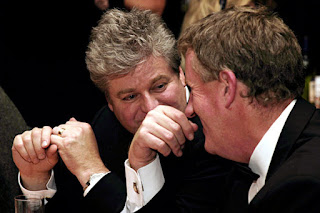This is a sample from the novel I'm currently working on, the second Grant Starr thriller. It is yet untitled.
Mayor Dutra, "Manny," one of the bad guys in the book, has become one of my favorite characters. He drinks too much and is crude and crooked: delicious qualifications for a fictional small-town mayor.
I was going to provide a little info to set up the scene, but thought better of it. You should be able to figure out what's going on from the text. The first draft will be done this month and I hope to have it published by June. Enjoy!
(But keep in mind this is in rough draft form and may have the heck edited out of it in rewrites.)
Manny had trouble getting out of bed Thursday morning; he'd gone drinking again after the council meeting, and he'd tied one on good. He crawled into the shower and let the hot water beat some life into him, then stumbled into the kitchen to get the coffee going.
When hot coffee began gurgling out of the machine, he switched a mug for the pot and held it there until it was half full, stuck the pot back on the plate and put an ice cube in the mug, pushed the cube around with a spoon and the phone rang.
He groaned and got the handset off the counter, punched the button and croaked into the mouthpiece, "Yeah?"
"Mayor Dutra?"
Manny frowned. "Yeah, who's this?" The accent was familiar, but his alcohol-hammered brain couldn't produce a name or a face.
"This is Lorne Eames, from Valley Unified Growers. How are you today?"
Eames ... He connected the name with the accent, but the name of the company didn't click. "I had better mornings."
"I hope that doesn't mean the meeting went poorly last night."
Ah, that Eames: the pot guy. Manny felt his spirits pick up, and felt as if a little more blood had found its way into his brain. "The council meetin' went just like I said it would."
"Hmm ... Does that mean it looks good for the vote next week?"
"I got three votes lined up." Manny took a hit of the coffee. "That's all I need, three."
"Right, you said all you needed was a simple majority. What are the odds someone might change their mind by next Wednesday?"
Manny pictured the faces of the three yes votes he had in his pocket; two had been blackmailed, so he was sure of them. Marina had said yes, as he'd thought she would, but because he had nothing on her, he couldn't be absolutely sure of her loyalty. He told Eames: "Zero. You don't got a problem with the money, do you?"
"No, Laken has the funds lined up so we'll have the cash next week."
"I want it Wednesday night, after the council meetin'. I want it right after the vote."
"Will the documents be signed at the meeting? We'll need our guarantees before we can release the funds."
Damn. Manny had forgotten about the papers. The papers would require the city attorney, Leonard Caldas, to be involved, and attorneys were never in a hurry to get anything done because they got paid by the hour. He wondered if he could talk to Leonard today, get him primed for next week.
"Mayor?"
"I forgot about the damn attorney. I'm gonna take the papers over there today and get him to put a rush on it."
"We'll be there next Wednesday, Laken and I, with the cash. If you can get the papers signed that night, it's all yours. We're eager to get started."
"I'll let you know," Manny said, then hung up.
He had drained his mug and so refilled it, this time adding milk to cool the coffee. At the table, he started thinking about how he could get the attorney Leonard Caldas to do something in a week that he usually took two months to do.











